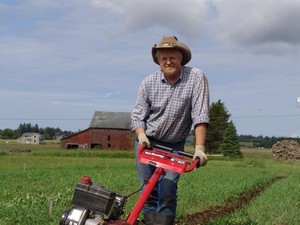23 Jan Sun 2011
Food Security from an Anthropological Perspective
We have been humans, in other words in the genus Homo, for about 2 million years. We have only been using agriculture as a way to gather food resources from the environment for the last 10,000 years. Agriculture has only been important to our species for less than 1% of our time on earth. Obviously, agriculture was not necessary to make us what we are. The way we made our living for most of our history was by hunting and gathering, often abbreviated as hunter-gathering. There is plenty of crossover. If you are gathering camas bulbs and you see a nice fat rabbit and you knock it down with a rock, you have meat for the pot. Likewise, you may find a trove of berries while out hunting deer.
Hunter-gathering is based on harvesting only. You just go out and take what is available in the environment. Of course there will be lean times and human physiology consequently has adapted to food shortages in our long history. This explains why your body changes modes (glycogen-burning to fat-burning) when you have a temporary downturn in your food intake, whether by choice (such as fasting) or by necessity (such as famine). Traditional cultures know this and even utilize this physiological shift to achieve changes in consciousness in shamanic or religious practices where fasting is common.
If you look with an observant eye or read case histories of traditional hunter-gatherer cultures, it quickly becomes apparent the environment is like a vast supermarket to hunter-gatherers, with many more kinds of food available than we have at our disposal now. As an example, we don’t eat small rodents like mice or rats because we have a cultural disdain. Other cultures use them as a matter of course, and they still provide a reservoir if times get tough. In the Seige of Leningrad during World War II, rats were regarded as a tasty morsel as food stocks diminished. In a more humorous vein, I have a post-apocalyptic survival manual in my library which goes to great lengths to encourage grilled rat on a bed of lettuce, mouse on a stick, and grasshopper ke-babs – with photos! Yum!
So, if you live in a vast supermarket and you just have to go out and get something to eat when you need it, do you have food security? Hell, yes! So why don’t we just go out and get food as we need it ourselves? Simply because there are too many of us. If I go out and get a duck or goose to eat every day or two, I would quickly deplete the reservoir of winged fowl in my immediate area, leaving none for my neighbors. It is the same all over the world now. There are a few pockets of the globe where hunter-gathering is still possible, but they are usually in protected reserves, like the Kalahari in South Africa. There are just too many of us for hunter-gathering to be viable for any significant number of us in the population. Since agriculture has allowed us to increase our population beyond the normal carrying capacity of our environment, we are locked into agriculture.
Not only are we locked into agriculture, we are locked into petroleum-based agriculture. In the last 50 years we have seen a steep growth curve in industrial agriculture. This is based not only on increased use of machinery manufactured with and powered by liquid petroleum fuels, but also an increased use of chemical fertilizers and herbicides/pesticides which use fossil fuels as feedstocks. Because we can feed more people converting fossil fuels into food through industrial agriculture, the worldwide population has increased from 3 billion in 1961 to over 7 billion sometime in 2011. The estimated carrying capacity of the earth varies based on your criteria, but if everyone were dependent on hunter-gathering it would be about .5 billion. With some sort of farming that is sustainable over the long term, estimates fall in the 1-2 billion range. Right now, we can feed all the people on the planet using industrial agriculture and unsustainable levels of fossil fuel consumption, but we don’t achieve this because of poor distribution – usually due to greed and/or graft – rather than lack of production. At the same time, corporations and governments are actively discouraging local agriculture around the globe in favor of agriculture based on commodities for market. The idea is to allow efficiencies in production world-wide through each country or geographical area growing the crop which provides the maximum amount of currency, which is then used to buy food on the world market. The practical application of this, however, relies on cheap oil for transportation, so globalization is doomed by increased prices for petroleum of all kinds as we draw down a finite resource. It is also unrealistic (some say criminal!) to focus on cash crops when what is really needed is food to eat.
The upshot is that modern industrial agriculture results in food insecurity. Even if there were better distribution and all the wheat and rice sent around the world actually got to the starving people who need it, there would still be a problem with unsustainable agriculture built upon cheap fossil fuels. In essence, even if we solved the greed/graft problem, we would still not have food security comparable to what hunter-gatherers enjoyed in the past.

